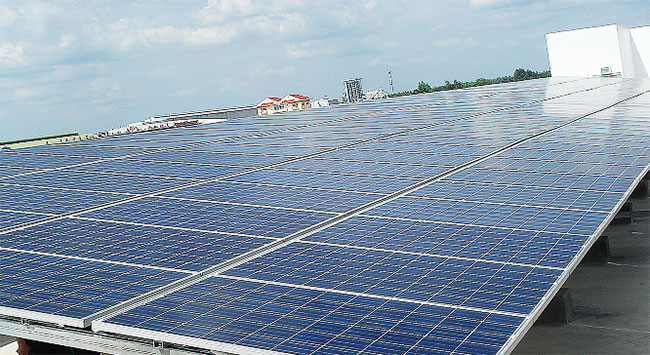Foreign firms embrace green power

The government has adopted various provisions for the increased promotion of renewable energies
Due to its dynamic economic growth, Vietnam’s energy demand will triple by 2020. Currently, 64 per cent of Vietnam electricity generation stems from fossil fuels, which has lead to a concern over an increase in CO2 emissions in the coming years.
The Vietnamese government therefore has adopted various policy measures to safeguard reliable energy supply including provisions for the increased promotion of renewable energies.
According to the government electricity development plan from 2010-2020, renewable energy will account for at least 5 per cent of total power supply by 2020. As of now, this contribution remains below 1 per cent. The plan offers great opportunities for private investors, where renewable energy is bustling.
Vietnam is currently studying the German renewable energy experience through co-operation with GIZ – an international organisation owned by the German government. Vietnam’s Ministry of Industry and Trade is working with GIZ on a joint project to develop renewables in Vietnam.
The country has a strong potential for generating renewable energy, including wind , biomass and biogas, as well as solar and hydropower. These could not only contribute to electricity generation, but also aid in climate change mitigation.
The New and Renewable Energy Department estimates Vietnam wind power potential at 7,000 megawatts and the potential for solar power, ranging from 4-5 kilowatt per hour per square metre. Solar energy in Vietnam is available all year-round, is rather stable, and could be distributed widely over different geographical areas. Solar energy, especially in the southern and central regions, can be used on average 300 days per year. It can be exploited to meet thermal and electrical power demands.
As an agricultural country, Vietnam has huge and diversified biomass resources from firewood, rice, coffee husk, straw, and bagasse. Abundant amounts of agricultural waste can be found throughout the Mekong Delta, accounting for approximately 50 per cent of country’s total, while the Red River Delta provides another 15 per cent. Annually, there are approximately 60 million tonnes of biomass available in agriculture residues and waste, of which 40 per cent has been utilised for household energy needs and electricity generation.
Other biomass resources include wood products, municipal and livestock waste. Wood products and residues at wood work companies also originate from natural or planted forests and imported wood.
“I think overall Vietnam has huge potential for renewable energy, just like other regional countries like Thailand, the Philippines, Indonesia and Malaysia,” said Werner Kossmann, chief technical advisor at Renewable Energy Support Project of GIZ.
Given the potential, some German companies are keenly eyeing Vietnam’s renewable energy market. Wind turbine manufacturer Fuhraender, for example, signed a contract with a local company for installing turbines with total 120 megawatts in central Binh Thuan province. Five of them were installed in 2009, and was connected to the national transmission grid.
Currently, nearly 50 wind power projects ranging from 6 megawatts to 150 megawatts are at different stages of development, but only two projects are operating and connected to the grid.
Although Vietnam has great potential for renewable energy, and the government also wants to push the industry, it faces obstacles due to a lack of incentives and weak support measures.
The government issued three decisions to support small hydropower, wind power, and municipal waste-generated projects in 2008, 2011 and 2014, respectively, while a support mechanism for biomass projects is still waiting prime ministerial approval.
Even though the support mechanisms have already taken effect, private investors have complained they are not supportive enough because of low feed-in tariffs, providing an explanation for why renewable energy has not yet boomed in Vietnam.
However, things may change shortly as the government is revising the mechanisms for raising feed-in tariff to attract private investment in renewable energy projects. Foreign investors recently also asked the government for a permission of a trial of select wind, solar and bio-gas power projects where independent power producers may sell directly to end users through one-on-one power purchase agreements. This is also awaiting a response from the government.
What the stars mean:
★ Poor ★ ★ Promising ★★★ Good ★★★★ Very good ★★★★★ Exceptional
Latest News
More News
- Cement industry pleads for energy efficient tech (December 08, 2015 | 11:00)
- Going green to save a bundle (June 08, 2015 | 10:00)
- Green buildings: the rising trend (June 02, 2015 | 09:41)
- Green buildings – key to sustainable urban development in Vietnam (May 18, 2015 | 17:00)
- Feed-in tariffs continue to haunt green energy prospects (December 15, 2014 | 10:47)
- Building material types intrinsic to green ratings (December 09, 2014 | 11:56)
- Turning an eco- smart dream into reality (December 09, 2014 | 11:55)
- Green products enjoy a growing presence at Vietbuild Hanoi 2014 (December 01, 2014 | 10:06)
- Country profits from green building (November 24, 2014 | 11:02)
- Firms flout enviroment laws (November 17, 2014 | 10:48)















 Mobile Version
Mobile Version